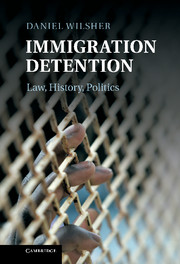Book contents
- Frontmatter
- Contents
- Acknowledgements
- Introduction and overview: free movement of persons and liberty of the person
- 1 The creation of immigration detention: from free movement to regulated borders in America and the United Kingdom
- 2 Modern immigration detention and the rise of the permanent bureaucratic enterprise
- 3 International law and immigration detention: between territorial sovereignty and emerging human rights norms
- 4 Negotiating detention within the European Union: redefining friends and enemies
- 5 Security and immigration detention: the problem of internment in peacetime
- 6 Global migration and the politics of immigration detention
- 7 Restoring the rule of law and influencing politics: placing boundaries around detention
- Bibliography
- Index
- References
1 - The creation of immigration detention: from free movement to regulated borders in America and the United Kingdom
Published online by Cambridge University Press: 05 November 2011
- Frontmatter
- Contents
- Acknowledgements
- Introduction and overview: free movement of persons and liberty of the person
- 1 The creation of immigration detention: from free movement to regulated borders in America and the United Kingdom
- 2 Modern immigration detention and the rise of the permanent bureaucratic enterprise
- 3 International law and immigration detention: between territorial sovereignty and emerging human rights norms
- 4 Negotiating detention within the European Union: redefining friends and enemies
- 5 Security and immigration detention: the problem of internment in peacetime
- 6 Global migration and the politics of immigration detention
- 7 Restoring the rule of law and influencing politics: placing boundaries around detention
- Bibliography
- Index
- References
Summary
Alien friends and alien enemies in the early modern period: libertarian equality and open borders
Until there was immigration control, there could be no immigration detention. Looking at liberal states in the mid-nineteenth century, we can see a relative lack of concern about ‘the border’ as a site of regulation. The crucial distinction was between ‘enemy’ and ‘friend’. Wars created ‘enemy aliens’ who were dealt with under the government's war powers and according to customary international law with its reciprocal arrangements for prisoner exchange. Thus, outside wars, aliens were not generally subject to controls on movement. As regards internal law relating to friendly aliens, there was a trend towards repealing former protectionist restrictions on their economic activities. The emerging global capitalist economy sought to find the highest rates of return and the commercial rights to trade became the new basis for international law. Free labour migration, within and between friendly nations, based upon wage competition, was a crucial element in supporting capital formation and this underpinned the ‘right’ of movement for aliens. Furthermore, in the new revolutionary governments of America and France, this was underpinned by the emerging idea of ‘inalienable’ Rights of Man, stripping away the former distinctions based upon rank or religion. Alienage appeared as another such arbitrary characteristic too.
These cosmopolitan times were reflected in significant juristic and public opinion disparaging discrimination against aliens. The libertarianism of the era was also suspicious of executive interference with civil rights, regardless of nationality. The distinction between alien friends and alien enemies was, however, fragile. As we shall see, the birth of the idea of immigration control largely destroyed this division; war powers in respect of enemy aliens mutated, sometimes through emergency powers, into a new general power over all aliens.
- Type
- Chapter
- Information
- Immigration DetentionLaw, History, Politics, pp. 1 - 56Publisher: Cambridge University PressPrint publication year: 2011



